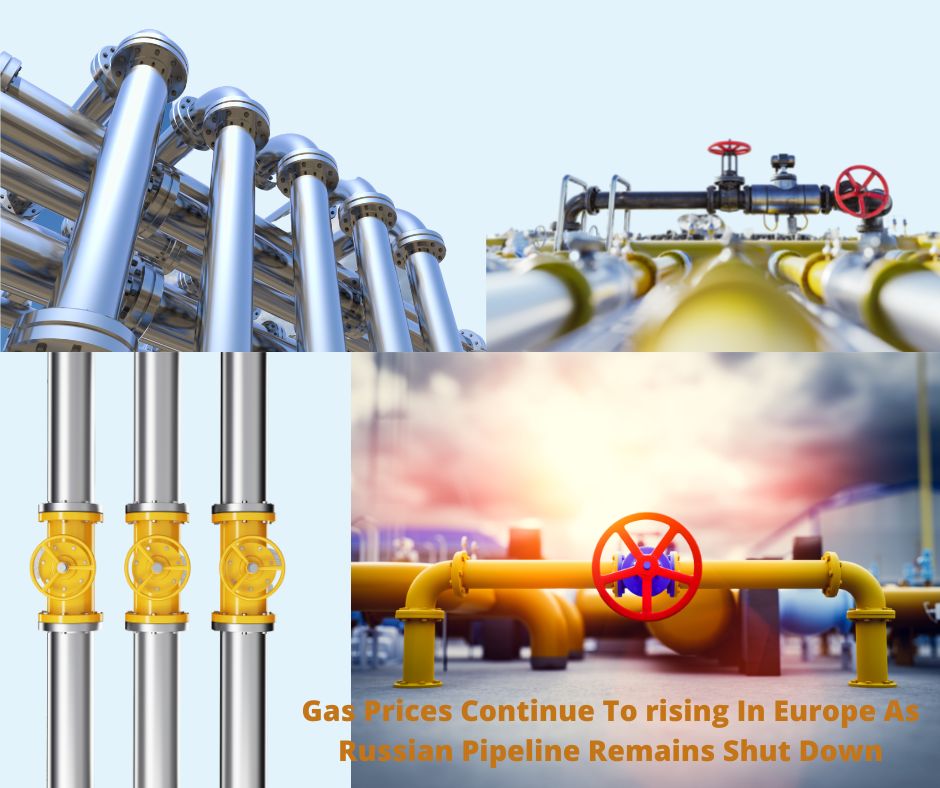
Source: AUN News
Concerns over energy supply this winter have increased due to Russia’s main gas pipeline to Europe not reopening as scheduled on Saturday.
The Nord Stream 1 pipeline may be permanently shut down after the state-owned energy company Gazprom reported discovering a leak. The Germany-bound pipeline has been closed for three days for what Gazprom called maintenance work.
During the turmoil in Ukraine, Europe accused Russia of exploiting its gas supply to threaten Europe. Moscow disputes this accusation. Since Russia invaded Ukraine, energy prices have increased sharply, and dwindling supplies could cause prices to rise even more.
Families in the EU are worried they won’t be able to pay the heating expense this winter. The UK might be impacted as well. Although not dependent on Nord Stream 1, the interruption of the pipeline might increase the cost of wholesale gas, which is what has caused the energy price cap to grow exponentially.
EU warned to get ready for Russian gas cutoff
Showers are chilly as Germany cuts off the gas
Germany’s gas reserves have increased from less than half in June to 84% complete today due to the standoff with Russia, which has compelled countries to replenish their gas supply. As a result, although they have decreased during the previous week, global gas prices are still high by historical norms. To limit Moscow’s capacity to finance the conflict, Europe is trying to wean itself from Russian energy, but the change may not happen soon enough. Charles Michel, president of the EU Council, said the action by Russia was “unfortunately no surprise.”
“The EU’s determination will not be altered by using gas as a weapon. Our progress toward energy independence will be accelerated. Protecting our countrymen and promoting Ukraine’s freedom are our obligations, “Tweeted. Moscow denies using energy supply as an economic weapon against Western countries supporting Ukraine.
The sanctions have been cited as why routine maintenance on Nord Stream 1 has been delayed, but the EU claims this is only an excuse. The Bundesnetzagentur, Germany’s network regulator, contended that the nation was better prepared for the interruption of Russian gas supply, although it urged individuals and businesses to reduce use. Shortly after the G7 countries decided to cap the price of Russian oil in favour of Ukraine, Gazprom made its announcement. The United Kingdom, United States, Canada, France, Germany, Italy, and Japan make up the G7 (Group of Seven).
By introducing a price cap, they are allowing countries who agree to the policy only to buy Russian oil and petroleum products shipped by sea and sold at or below the price cap. However, Russia asserts that it would not export to nations that adhere to the restriction. The gas pipeline, which runs from the coast of Russia near St. Petersburg to northeastern Germany, has a daily capacity of 170 million cubic metres.
Before Russia invaded Ukraine, Germany had also sponsored the development of a rival pipeline known as Nord Stream 2. However, the project was abandoned as a result. The malfunction, according to Gazprom, was found at the Portovaya compressor station during an inspection that included workers from Siemens, the German company that looks after the turbine. It claimed that only specialised workshops, constrained by Western sanctions, could repair oil leaks in significant engines.
Siemens, however, stated: “Such leaks can be fixed on-site and typically do not interfere with a turbine’s functioning. Within the parameters of maintenance work, it is a standard procedure.”
The Nord Stream 1 pipeline has been shut down numerous times since the invasion.
In July, Gazprom cut off supplies for ten days while claiming “a maintenance pause.” Ten days later, it started up again, but much more slowly. Gas in Europe is currently nearly four times more expensive than it was a year ago, and the cost of living crisis will significantly worsen as a result, according to the speaker. Gas is employed in numerous industrial processes, including the production of fertiliser. Therefore its use will have an impact on both costs and employment.
There is no chance of this. Hours after prominent western finance ministers pledged to ratchet penalties against Russian oil, Russia’s state-controlled gas company announced an indefinite extension to a three-day maintenance pause to gas shipments through the continent’s crucial energy artery. The pipeline cannot function without German imports of technology, which are now subject to restrictions, according to Gazprom’s stated justification, which is that an oil leak has been discovered.
However, few analysts think this is anything other than a blackmail attempt on Europe to get supplies. This development is severe. Even during the Cold War, Russia continued to supply gas to Europe.
Analysis by: Advocacy unified Network
